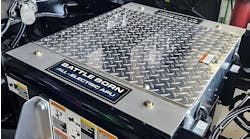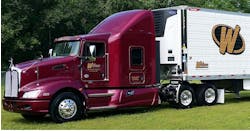In 1938 the transport refrigeration business was still literally in the ice age, a time when using ice and salt was the only practical way for haulers to keep perishable shipments from spoiling.
Visionary Joe Numero knew there had to be a better way. He and his team developed the first successful mechanical transport refrigeration unit (TRU) and, in the process, gave birth to a whole new industry.
The company Numero founded celebrates its 75th anniversary this year. Thermo King, a manufacturer of transport temperature control systems for a variety of mobile applications and a brand of Ingersoll Rand, foresees a wide range of important innovations that will make refrigerated transportation even more effective and efficient in the years to come.
The science of refrigerated transportation has advanced dramatically over the last 75 years with developments such as nose-mounted units, diesel-powered TRUs, stopstart temperature controls, auxiliary power units and advanced electronics. The next 75 years will no doubt bring about customer-driven innovations in technology, service and operations that are just as impactful.
Industry leaders like Thermo King are applying current and emerging technologies and practices to help customers solve problems and achieve higher levels of performance with lower total cost of ownership. Following are some thoughts on what the future holds for the refrigerated transportation industry:
• Fuel economy will be a big driver of innovation in the refrigerated transportation industry and with good reason. Fuel represents the largest component of total operating costs for most refrigerated fleets, and fluxuating fuel prices make it one of the least controllable expenses.
• Sustainability has become a watchword for the industry. Original equipment manufacturers have introduced new products that use less fuel and therefore leave a smaller environmental footprint. For example, Thermo King offers products that comply with the new Environmental Protection Agency Tier 4 Final non-road diesel engine standards and California Air Resources Board (CARB) regulations, while also offering better performance, lower cost and improved reliability. Operators will willingly adopt environmentally friendly products and practices that deliver economic value.
• Food safety and freshness have become global priorities, driven both by government regulation and consumer pressure. Current and pending regulations in Europe, the United States, and elsewhere place new expectations on food producers, processors and transporters, including the requirement to trace shipments across all links of the supply chain. To help meet these requirements, advanced TRUs include the capability to track, record and transmit data that can help fleet operators establish the location of a particular load at a particular time, as well as document conditions inside the refrigerated container, truck or trailer.
• Globalization of the food supply will lead to more temperature-sensitive loads traveling by more than one mode of transportation. For example, refrigerated containers carrying fruit from South America to the United States may travel by ship, railcar and highway truck before reaching their final destination.
• Whether they are hauling food, pharmaceuticals, chemicals, cosmetics, or other temperature-sensitive loads, operators are tapping into advanced tracking capabilities that use global positioning system data and advanced wireless communications technologies to provide operators with real-time and historical information about load temperature, and asset location – for one trailer or an entire fleet – answering operators’ needs for better safety, security and efficiency.
• The new generation of drivers and other operator employees – including the tech-natives born in the information age – has different expectations than their older colleagues. They expect to interact with truck refrigeration units and refrigeration systems using their smart devices, which changes the way original equipment manufacturers (OEMs) and operators think about user interface.
The demand to move food and other temperaturesensitive goods from point of production to point of consumption will continue to grow in the years ahead, with no end in sight. A slower than expected recovery, volatile fuel prices and more stringent environmental, and food-safety requirements make this a challenging time for everyone in the cold chain, including owners and operators of refrigerated fleets.
With evolving technology and sound operating practices, the refrigerated transportation industry stands ready to meet the needs of its customers and society for the next 75 years, and beyond.
Doug Lenz is director of product management for Thermo King, a leading provider of transportation temperature control systems for mobile applications and a brand of Ingersoll Rand. The company is celebrating its 75th anniversary this year.



